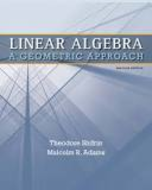Solution Found!
Decide whether the following sets of vectors give a basis for the indicated space. a
Chapter 3, Problem 3(choose chapter or problem)
Decide whether the following sets of vectors give a basis for the indicated space.
a. \(\{(1,2,1),(2,4,5),(1,2,3)\} ; \mathbb{R}^3\)
b. \(\{(1,0,1),(1,2,4),(2,2,5),(2,2,-1)\} ; \mathbb R^3\)
c. \(\{(1,0,2,3),(0,1,1,1),(1,1,4,4)\} ; \mathbb{R}^4\)
d. \(\{(1,0,2,3),(0,1,1,1),(1,1,4,4),(2,-2,1,2)\} ; \mathbb{R}^4\)
Questions & Answers
QUESTION:
Decide whether the following sets of vectors give a basis for the indicated space.
a. \(\{(1,2,1),(2,4,5),(1,2,3)\} ; \mathbb{R}^3\)
b. \(\{(1,0,1),(1,2,4),(2,2,5),(2,2,-1)\} ; \mathbb R^3\)
c. \(\{(1,0,2,3),(0,1,1,1),(1,1,4,4)\} ; \mathbb{R}^4\)
d. \(\{(1,0,2,3),(0,1,1,1),(1,1,4,4),(2,-2,1,2)\} ; \mathbb{R}^4\)
ANSWER:Step 1 of 4
(a). Given set of vectors is
To determine whether V is basis for or not.
Let us consider the matrix
To find if the given set is linearly independent or not, we will solve the equation by considering the augmented matrix
The row reduced echelon form of the augmented matrix is
Since the solution of the equation is not
, therefore, the given set of vectors V is not linearly independent and hence is not a basis for
.
